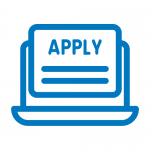About the Program
DELIVERY METHOD: FULLY ONLINE
ENROLLMENT STATUS: FULL-TIME | PART-TIME
SCHOLARSHIPS AVAILABLE
DELIVERY METHOD: FULLY ONLINE
ENROLLMENT STATUS: FULL-TIME | PART-TIME
SCHOLARSHIPS AVAILABLE
The online master of science degree in Health Communication for Social Change prepares students to achieve meaningful public health outcomes through communication, social marketing and other behavior-change strategies. Students gain core public health competencies and receive training in health literacy, strategic marketing, social media strategy, multimedia production, and health entrepreneurship along with other critical communications domains.
Learn to collaborate across disciplines and make a real difference by addressing health inequalities with human-centric approaches. Elevate your career, inspire change and become a leader in health communications.
Delivery method: This program is offered fully online. All courses are available asynchronously. Some courses may have the option to attend synchronously. Find answers to common questions about our online programs and delivery methods here.
As the the only fully online health communications program offered by a CEPH-accredited school of public health, this degree is designed for working professionals looking to explore how effective health communications can build a more intersectional and equitable public health.
Students will learn how to transform public health through the art of health communication. Learn to tailor your messages for diverse audiences and sectors, articulate public health issues in relatable terms and navigate the complexities of cultural competence. Become an adept communicator who makes public health accessible and impactful for all.
Because this program emphasizes building technical skills, graduates will have access to a wide variety of employment opportunities at city, county, and state health departments, advertising and marketing agencies, non-governmental organizations; philanthropic organizations, and more through our engaged faculty.


This degree program is fully online.
| Foundational Knowledge (0 credits) | PUBH 601 Foundations of Public Health Knowledge* |
| Core Coursework (15 credits) | PUBH 610 Introduction to Health Systems, Policy, and Management |
| PUBH 611 Health Equity, Communication, and Advocacy | |
| PUBH 612 Designing and Evaluating Public Health Interventions | |
| PUBH 613 Designs, Concepts, and Methods in Public Health Research | |
| PUBH 614 Quantitative and Qualitative Data Analysis Methods in Public Health Research | |
| Required Coursework (15 credits) | CHSS 626 Health and Media Literacy for Public Health Advancement |
| CHSS 627 Social Marketing and Health Communication Theory and Practice | |
| CHSS 628 Multisectoral Engagement for Sustainable Health: Local to Global Development, Implementation and Measurement | |
| CHSS 629 Strategic Multimedia Production and Innovative Health Communication: Design and Delivery | |
| CHSS 630 Case Studies in Social Marketing, Health Communication, and Strategic Diplomacy for Public Health | |
| Elective Coursework (3 credits) | One (1) elective chosen in consultation with faculty advisor |
| Culminating Experience (3 credits) | CHSS 700 Health Communication Capstone Project |
| Total Credits Required | 36 |
*Students who have a CEPH-accredited undergraduate or graduate degree in public health can be waived from PUBH 601 by submitting a Course Waiver Request.

These sequences are recommended for full-time students. Part-time students are encouraged to meet with a staff advisor to map out an appropriate plan of study.
| For students beginning their program during the fall semester: | ||
| Semester | Course | Credits |
| Year 1 Fall | PUBH 601: Foundations of Public Health Knowledge* | 0 |
| PUBH 613: Designs, Concepts, and Methods in Public Health Research | 3 | |
| PUBH 610: Introduction to Health Systems, Policy, and Management | 3 | |
| PUBH 611: Health Equity, Communication, and Advocacy | 3 | |
| CHSS 626: Health and Media Literacy for Public Health Advancement | 3 | |
| Year 1 Spring | PUBH 614: Quantitative and Qualitative Data Analysis Methods in Public Health Research | 3 |
| CHSS 627: Social Marketing and Health Communication Theory and Practice | 3 | |
| CHSS 628: Multisectoral Engagement for Sustainable Health: Local to Global Development, Implementation, and Measurement | 3 | |
| PUBH 612: Designing and Evaluating Public Health Interventions | 3 | |
| Year 2 Fall | CHSS 629: Strategic Multimedia Production and Innovative Health Communication: Design and Delivery | 3 |
| CHSS 630: Case Studies in Social Marketing, Health Communication, and Strategic Diplomacy for Public Health | 3 | |
| Elective | 3 | |
| CHSS 700: Health Communication Capstone Project | 3 | |
| For students beginning their program during the spring semester: | ||
| Semester | Course | Credits |
| Year 1 Spring | PUBH 601: Foundations of Public Health Knowledge* | 0 |
| PUBH 613: Designs, Concepts, and Methods in Public Health Research | 3 | |
| PUBH 610: Introduction to Health Systems, Policy, and Management | 3 | |
| PUBH 611: Health Equity, Communication, and Advocacy | 3 | |
| CHSS 628: Multisectoral Engagement for Sustainable Health: Local to Global Development, Implementation, and Measurement | 3 | |
| Year 1 Fall | PUBH 614: Quantitative and Qualitative Data Analysis Methods in Public Health Research | 3 |
| CHSS 626: Health and Media Literacy for Public Health Advancement | 3 | |
| CHSS 629: Strategic Multimedia Production and Innovative Health Communication: Design and Delivery | 3 | |
| CHSS 630: Case Studies in Social Marketing, Health Communication, and Strategic Diplomacy for Public Health | 3 | |
| Year 2 Spring | PUBH 612: Designing and Evaluating Public Health Interventions | 3 |
| CHSS 627: Social Marketing and Health Communication Theory and Practice | 3 | |
| Elective | 3 | |
| CHSS 700: Health Communication Capstone Project | 3 | |
*PUBH 601 should be completed during a student’s first semester. Students who have a CEPH-accredited undergraduate or graduate degree in public health can be waived from this requirement by submitting a Course Waiver Request.

Check out some of the profiles of students in our program below! See the full selection of profiles here.

Saif Choudhury’s passions and experience sit at the intersection of comedy and mental health. Saif has seen firsthand, in his family, himself, and at work as a counselor, the ways in which mental illness can disrupt people’s lives. He’s also seen how comedy can disrupt tragedy … and bring people joy.
Through the Health Communication for Social Change program, he’s building his skills in communication to become the “best salesperson for hope.” His goal is to both explain the intricacies of mental health that are often glossed over and to empower people with the information and hope they deserve to take control over their lives.
He’s finishing up his final semester in the MS4SC program, working on a capstone focused on building awareness around specific facets of Obsessive Compulsive Disorder and “Pure O,” and how people with OCD can get the help they need.
Saif has held many hats during his professional career, as a mental health counselor, SAT and ACT tutor, comedy tutor, and sketch comedy comic. He says, “No matter how many times I might fail – which happens a lot in comedy as I’ve come to find out – my true goal in life will always be to use the power of comedy to help people feel better.”
Check Saif out onstage at Bragging Rights, a live sketch comedy competition, during its Spring 2022 run at the Asylum Theater NYC!

“I want people to live a wonderful life.” That’s how Dunstanette Macauley-Dukuly describes the motivation for both her work as a career counselor and her public health aspirations. For the last few years, Dunstanette has mentored students in STEM and connected them to career opportunities, through her position in higher education career services,
Dunstanette grew up around activism and faith-rooted organizing in Newark, New Jersey. She’s known since she was young that there are systemic roadblocks that impede many people from being well. In undergrad, she studied public health, digging deeper into the history of global systems that obstruct health equity, particularly for Black and low-income people.
She came back to public health education last year by enrolling in the Health Communication for Social Change program and, now, she’s gaining communication skills to amplify the voices of marginalized people in hopes of creating more equitable systems. “One of the things I’ve really appreciated about my public health education is that it’s so practical,” she says.
Dunstanette has applied her public health skills professionally in social marketing, advocacy, event planning, and career services. And now, she’s optimistic about how combining theory and practice in communication can make changemaking more accurate, efficient, and effective.
“I’m excited for the type of professional I’ll be after I graduate.”

Nina Agrawal, MD is board-certified in child abuse pediatrics and has spent much of her career providing care to children experiencing various forms of maltreatment. When the pandemic hit and school went remote, Nina knew first-hand that there would be ripple effects on kids, many of whom were already at risk. She published an op-ed in the NYTimes about it to reach as many people as possible about the critical public health issue.
After publishing this piece and building connections with staff at CUNY SPH, Nina enrolled in the Health Communication for Social Change program. The Times piece was followed by other opinion articles, including one in the NY Daily News where she shared her unique insights on addressing child sex trafficking.
“Being able to meet face to face – or by voice in this digital world – is important to me – personally and professionally.” She’s now getting to know others involved in the program and is excited by the prospect of building bridges between more pediatricians and public health professionals.
In addition to her clinical work, Nina is expanding her focus, through writing and grassroots organizing, to “effect broad systems change” for young people who have historically been marginalized. Through the program, she’s entering a broader “public health framework.”
Nina takes courses part-time, which, she says, “gives me the time to devote to my clinical work and advocacy work for various child health issues. It also allows me to apply the skills I’m gaining through the program in real time.”